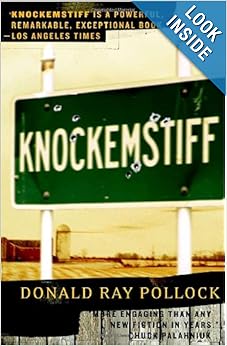 Knockemstiff is a collection of short stories written by a Ross County, Ohio, author about a Ross County, Ohio, town. I have been through Knockemstiff. My dad and indeed many of my ancestors were born and raised in Ross County. I've been on a genealogy quest lately and am surprised, truly, by how many of my forebears lived in this very part of Ohio where I live now as early as the 1790s. One of the key towns in many of the Knockemstiff stories is Massieville, in whose cemetery many of my relatives are buried, including my paternal grandmother, Bessie Ann Grow Burns Dickerson. So, the landscape of these stories is very much my own landscape and many of my relatives followed the life path of the characters.
Knockemstiff is a collection of short stories written by a Ross County, Ohio, author about a Ross County, Ohio, town. I have been through Knockemstiff. My dad and indeed many of my ancestors were born and raised in Ross County. I've been on a genealogy quest lately and am surprised, truly, by how many of my forebears lived in this very part of Ohio where I live now as early as the 1790s. One of the key towns in many of the Knockemstiff stories is Massieville, in whose cemetery many of my relatives are buried, including my paternal grandmother, Bessie Ann Grow Burns Dickerson. So, the landscape of these stories is very much my own landscape and many of my relatives followed the life path of the characters.However, Pollack succeeded in making these people real to me, and awakening not sympathy, but at least a bit more understanding. By the middle of the book, I could see that the stories formed an arc of some sort, tracing the pathologies of generations mutate and transmutate in expected and unexpected ways. He also records a street history of drugs abused over time, culminating in the current prominence of prescription painkillers.
I was reminded a lot of Faulkner when reading these stories. He, too, dignified the ugly, the profane, without mocking. In one of Faulkner's books a character falls in love with a cow. And you don't laugh.
Knockemstiff is not for the faint of heart or the over-sensitive. It is graphic and grim. The writing is terrific, though. Vivid descriptions, settings painted on the screen of the mind, smells, sounds. I don't think I was aided much by having driven through Knockemstiff, because these stories took place off the highway, inside barricaded homes, in caves, in trailers, in cars, in hollers, creek beds. The bleak inner landscape of the characters was recorded in their bleak structures. They could only live within what they knew. You can't really do anything else.
The people in the Knockemstiff stories are my neighbors, relatives, and friends. I must honor even their squalor, somehow. These stories help.
No comments:
Post a Comment